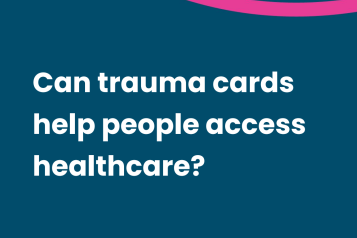Mental health and the journey to parenthood: Helen's story

Two years before I had a baby I was diagnosed with general anxiety disorder. When I became pregnant I was still living with anxiety, but I felt I was able to manage it. I didn’t realise how having a baby would cause it to come back.
Finding out I was pregnant
“When I found out I was pregnant, I was in complete denial. I wasn’t excited, and I didn’t want to talk about it. I thought I was being a super woman by acting as if nothing had changed, like going to the gym as regularly as I had before. I didn’t think there was anything weird about how I was feeling.
Looking back now, I realise I was suffering from prenatal depression, but at the time I couldn’t see it.”
Managing on my own
“At my first appointment with the midwife they asked me about my mental health and that of my family. Because I had general anxiety disorder and my sister had experienced postnatal depression with both of her children, my mental health was flagged as a potential risk.
When I saw the midwife at 28 weeks I broke down in tears and cried about having a baby. The midwife became quite emotional and was supportive of how I was feeling. At another appointment I was panicking about how I would be able to work, be a mother and run a home. My midwife told me that what I needed was a post-birth plan.
But while there were conversations about how I was feeling, a lot of it was put down to normal worries. I was told that everything was okay, when it wasn’t. I saw a different midwife at every appointment and no one referred me to extra support.”
A difficult start
“My labour was quick and traumatic, and they didn’t do any of the post-birth checks at the hospital. When I then went to my GP, they were also unsure why I was there and didn’t make me feel reassured.
It was only when I went to the midwifery office, five days later, that my baby was looked at. They could see that I wasn’t okay and decided I need some extra monitoring.”
Managing with an unwell baby
“I had a very poorly baby. She was screaming for 14 – 15 hours a day and no one could tell me why. It was a huge strain on everything, including my relationship.
My baby’s illness was repeatedly misdiagnosed. I was told that I was imagining it and as a first-time mum, I just didn’t know what I was doing. Even when my mum, who has several children and grandchildren, told the GP that my baby was clearly unwell, we were told we were over worrying."
One GP even said that my baby was crying because my husband had gone back to work early. There was very little support for me to access, I was lucky to have my family to help.
Breaking point
“I knew I had postnatal depression, because I recognised the signs that my sister had also experienced.
One morning it got so bad that I decided I wanted to leave. Before I did anything, I phoned my mum and close friend, who immediately came round to sit with me. Fortunately, there was a community midwife who lived three doors down. She came to visit me that day and I told her that I didn’t want anything to do with my baby anymore.
She rang the GP for me and said that she was with a mum who was unwell and needed to be seen.
Because of how low I was, the GP decided to put me on anti-depressants. Although I was still struggling, it did help to stabilise me. It made me feel like I had a safety net.”
Turning point
“In her own time, the community midwife took it upon herself to phone the dietician at my local hospital. They kindly contacted me, and after speaking about my daughter’s symptoms, agreed that she had the same allergy that my nieces have. This meant I could get a prescription for the formula my baby needed.
However, because the GPs had refused to listen to me, by this point my daughter had stopped feeding. As a result, she developed lots of waste, which led to a kidney infection that nearly killed her.
After being admitted to hospital, she was immediately put on the correct formula. I was in the hospital with her for about a week. That was a turning point for me, as the consultants said I had been right and had known what the problem was from the beginning. It helped a lot to hear that, but she didn’t get better for many months.”
Further complications
“My daughter could now feed and keep milk down, but she also had a suspected clicky hip. After an appointment with the physio team she was put in a harness, which meant looking after her didn’t become any easier.
Because of the harness, I was only able to bath her once a week and I had to go to hospital to do it. It also meant I couldn’t hold her or cradle her when she was in pain. It made it very difficult.”
I can only describe it as the year from hell
Getting support
“Over the summer I saw the Health Visitor who offered to refer me to the local Infant-Parent Perinatal Service, which provides post-natal counselling. However, I was told there was a long waiting list and if I could afford to pay privately I would be seen quicker.
Because I couldn’t afford to pay for it and I thought I didn’t need it, I found myself still struggling months later. I had begun having intrusive thoughts again and was walking aimlessly for hours with my daughter, who was still screaming constantly.
When I realised I was thinking about leaving her and hurting myself, I decided to walk directly to the doctors and make an appointment. They immediately increased my medication and referred me to urgent counselling.
I saw someone the next day and it was a massive turning point.”
Changing the relationship I had with my daughter
“In my first session, my therapist diagnosed me with PTSD, prenatal depression and postnatal depression. After that I continued to see her until around my daughter’s first birthday. It was a huge support to know I had someone to turn to. Even when I didn’t have an appointment in person, my counsellor would phone me. It was a life saver.
The difference counselling made to my relationship with my daughter was also incredible.
For the first year of her life I had no feelings towards her – I felt numb and resented her. Counselling helped me to unpick these thoughts and understand what we’d been through as a family, as well as what labour had done to me and my body. It was amazing that my counsellor helped me get to the bottom of how I was feeling.
Although I’m still living with depression, counselling has helped me to recognise it, acknowledge it and manage it. I don’t know what I would have done without that support.”
The changes that Helen would like to see for other mums
More support and information during pregnancy
“There needs to be more support for new parents before the baby is born. There is so much talk about birthing plans, but nothing could have prepared me for how horrific it is. I was so frightened, I thought I was going to die, which then made it difficult to bond with my baby. I wish people had just been honest with me.”
Services listening to parents
“When my baby was ill, no one trusted my instincts. I was constantly told ‘babies cry, what do you expect?’ It was like my opinion didn’t count because I was a first-time mum. Not being listened to put a huge strain on my life, my relationship and my wellbeing.”
Consistent support
“I repeatedly saw different doctors, and they often seemed uninterested when I was there. The only constants were my health visitor and community midwife. The idea that you don’t need support because you had your baby 12 weeks ago doesn’t make any sense. How can you open up when you’re seeing a different hospital midwife at each appointment?”
Support that is easier to access
“There needs to be fewer barriers to getting support. It’s not easy to get on a bus with a baby in order to speak to someone. Having to see the GP was so difficult.
It would have been good if I could talk to someone like me, before I had my baby. I was lucky to have my sister who knew what I was going through and who could reassure me that I would get through it.”
Have you been affected by this story?
If the content of this story causes you to think of anything that has happened to you or someone you know and you feel upset, worried or uncomfortable, please see the Maternal Mental Health Alliance's support page for a list of services who may be able to help.


